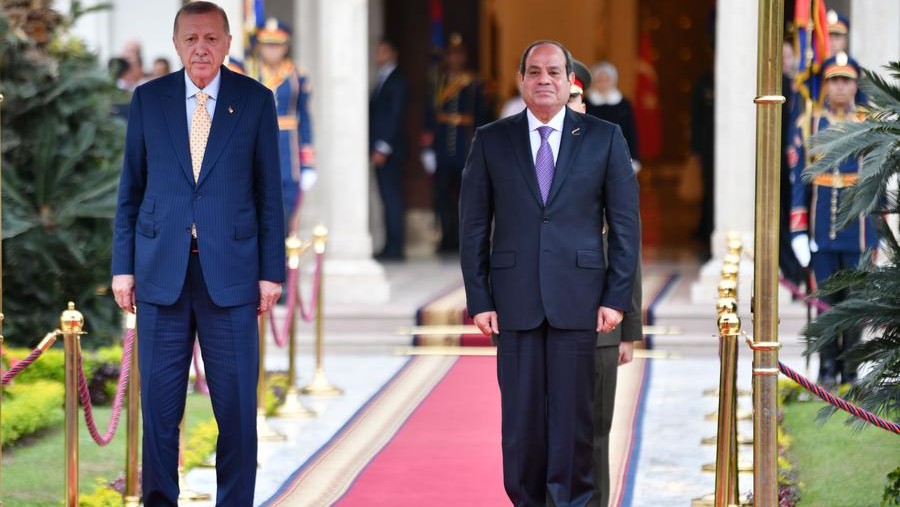Turkish president Recep Tayyip Erdogan made a rare visit to the Egyptian capital Cairo on Wednesday, February 14, marking the end of more than a decade of hostility between the countries. Turkey and Egypt have declared their wish to cooperate to jointly address conflicts in the region.
Erdogan arrived in Cairo after visiting the UAE earlier in the day. This was the first visit by a Turkish head of state to Egypt since 2012.
Erdogan met Egyptian President Abdel Fattah el-Sisi. The leaders addressed a joint press conference where they demanded immediate ceasefire in Gaza, calm in the occupied West Bank, and the resumption of the process to establish an independent Palestinian state along the pre-1967 borders with Jerusalem as its capital, AhramOnline reported.
Erdogan also cautioned Israel against carrying out a ground offensive inside Rafah where more than 1.4 million displaced Palestinians are living at the moment. He termed it an attempt to depopulate Gaza and commit a massacre of Palestinian people.
More than 28,600 Palestinians have been killed and over 68,000 have been wounded in the Israeli war on Gaza since October 7. A majority of the besieged territory’s population has been forced to move to the narrow territory of Rafah in Gaza’s south by Israeli forces where they are living in temporary shelters.
Israel has carried out air strikes in the densely populated region killing hundreds of people in the last few days. It plans to carry out a ground offensive as well despite protests from various countries and humanitarian groups, including the UN, which have warned of a major humanitarian disaster.
Egypt has already warned against any such move and has even threatened to suspend the peace treaty with Israel signed in 1979. Egypt has termed the Israeli war in Gaza an attempt to force Palestinians permanently out of the territory and fears that a ground offensive in Rafah would force them to move to its territory.
Turkey and Egypt expressed their willingness to continue their cooperation to provide increased humanitarian aid to Gaza and rebuild the territory once the war is over.
The ceasefire negotiation between Israel and Hamas mediated by Egypt, the US, and Qatar was taking place in Cairo. The talks ended without any results on Wednesday according to the Israeli media reports. According to the Times of Israel, without consulting his cabinet members, Prime Minister Benjamin Netanyahu apparently “vetoed” further talks.
Concrete moves towards normalization of relations
In July 2023, Egypt and Turkey upgraded their relationship by appointing ambassadors for the first time since 2013.
Turkey withdrew its ambassador from Egypt in opposition to the military coup against president Mohamed Morsi in July 2013. Morsi was elected president in June 2012 in the first elections held in the country following the removal of Hosni Mubarak from power in a popular uprising in 2011.
Turkey’s ruling Justice and Development Party (AKP) is an ideological ally of the Muslim Brotherhood, which Morsi was associated with.
The Muslim Brotherhood was banned in Egypt as a terrorist organization following the coup led by El-Sisi.
Both the countries have since been rivals in regional politics, confronting each other in Libya where they supported rival factions in the country’s war. Turkey supported the Government of National Accords based in the capital Tripoli against the Libyan National Army led by Khalifa Haftar which was backed by Egypt.
On Wednesday, both the countries decided to “strengthen consultation” to work for early national elections in Libya and the unification of the country’s armed forces.
They also have differences over Turkish plans for oil exploration in the eastern Mediterranean and on the issue of maritime boundaries. On Wednesday, both the countries said they will cooperate in the matter to achieve maximum mutual benefit from the region’s natural resources.
Both the countries signed several other deals during Erdogan’s visit which included attempts to increase the bilateral trade from the current annual USD 10 billion to USD 15 billion and to play a vital role in mediation in the region to end numerous conflicts such as war in Sudan and Somalia.





